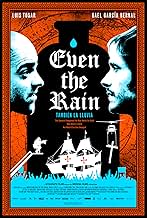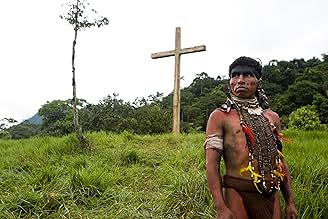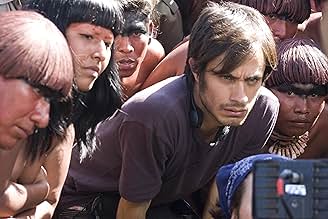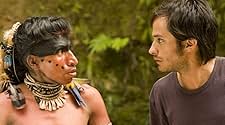IMDb RATING
7.4/10
15K
YOUR RATING
As a director and his crew shoot a controversial film about Christopher Columbus in Cochabamba, Bolivia, local people rise up against plans to privatize the water supply.As a director and his crew shoot a controversial film about Christopher Columbus in Cochabamba, Bolivia, local people rise up against plans to privatize the water supply.As a director and his crew shoot a controversial film about Christopher Columbus in Cochabamba, Bolivia, local people rise up against plans to privatize the water supply.
- Awards
- 22 wins & 17 nominations total
- Director
- Writer
- All cast & crew
- Production, box office & more at IMDbPro
Featured reviews
This is a great movie; a movie inside another movie, a movie out of another movie. Told a story when the Spaniards under the command of Christopher Columbus brutalized and ransacked Bolivia, then the government was bought out and mustered in the big corporate came in modern time to raped the country, took away the local people's water resource, the well, the water supply. Just like what the demonstrators said: "They need the vapor from our breaths, the sweat on our brows, they even want to take the rain dropping from the sky(Even The Rain)". The third storyline is the movie company that wanted to take advantage of the poor country's poverty and high unemployment, getting the cheap labors to shoot the movie. "The truth got many enemy, the lie got many friends", "You don't understand, water is our life", these dialog are so profound and true. Unfortunately, the movie crew was in the wrong time and at the wrong place encountered the explosion of the street riots and the demonstrations. This is a very complicated movie but shot so well to portray all the involving parties and single person got their own demons, dilemmas, tensions, numbness, helplessness, and hopelessness,self-denial, cowardice, depression and frustrations. The complexity of this movie was so vividly painted on the big screen. This is a great movie.
"No problem can be solved from the same consciousness that created it" - Albert Einstein
In a film within a film, director Sebastian (Gael Garcia Bernal) and producer Costa (Luis Tosar) are shooting in Cochabamba, Bolivia in the year 2000. The film they are working on proposes to depict Christopher Columbus' exploitation of the indigenous native population in his voyage to the Americas and the effort of two priests to stand up to the Catholic Church. Written by Paul Laverty, the regular screenwriter for British director Ken Loach, and dedicated to the late progressive historian Howard Zinn, Iciar Bollain's openly political drama Even the Rain takes on the past history of exploitation of native populations, showing a parallel to current history.
The film developed through Laverty's desire to dramatize the life of Bartolomé de las Casas, a Dominican friar who becomes an anti-slavery activist in defiance of the church and his native Spain. Shot in the high Andes because of budgetary constraints, Even the Rain attempts to conflate three levels of exploitation: the historical treatment of the Native Americans by the Spanish conquerors in the 16th century, the actual attempt by Bolivia to cede control of the country's water supply to a British-American corporation, and the filmmakers' cost-cutting that results in the Quechua population being paid only $2.00 an hour as extras.
Opening with a "La Dolce Vita" shot of a wooden crucifix being transported to the mountains by helicopter, the film moves to an open casting call in Cochabamba as hundreds of Bolivians line up to audition for a role in the projected film. Turned away by the producer when the quota of locals is filled, Daniel (Juan Carlos Aduviri), a vocal political activist demands that the Bolivians be hired even after they are told to leave. As a result of his strong personality, he is selected to play the role of Hatuey, the first Indian to be crucified for resisting the Spanish and Christian empire.
A problem arises, however, when Daniel becomes the leader of a local group protesting the social injustice entailed in Bolivia's privatization of its own water supply (a true event that forbade the native population from collecting their own rainwater). Even after Daniel tells him "You don't understand, water is life," Costa demands that the young actor give up his political campaign to concentrate on the film which needs him desperately. As the director, Sebastian likewise must walk a thin line between balancing his ideals with his powerful desire to present a revisionist history of Columbus to the world. "The protests will be forgotten, but the film will last forever," he argues.
Tosar is outstanding as the arrogant producer who is drawn unwillingly into the political protest. Overheard on a phone call, Costa brusquely tells a foreign investor how he is putting one over on the locals, not realizing that Daniel, standing only a few feet away from him speaks English. Eventually, however, Costa is forced to choose between the success of the film and the demands of his conscience staring at him relentlessly.
Even the Rain tells us that understanding the past is meaningless unless that knowledge can be made relevant to the present day, a lesson that the characters must learn the hard way. In lesser hands, the film could easily have become didactic or preachy, but Bollain maintains a steady hand and the result is an engaging and powerful film that not only speaks out loudly against injustice, but does so with poetry and passion.
In a film within a film, director Sebastian (Gael Garcia Bernal) and producer Costa (Luis Tosar) are shooting in Cochabamba, Bolivia in the year 2000. The film they are working on proposes to depict Christopher Columbus' exploitation of the indigenous native population in his voyage to the Americas and the effort of two priests to stand up to the Catholic Church. Written by Paul Laverty, the regular screenwriter for British director Ken Loach, and dedicated to the late progressive historian Howard Zinn, Iciar Bollain's openly political drama Even the Rain takes on the past history of exploitation of native populations, showing a parallel to current history.
The film developed through Laverty's desire to dramatize the life of Bartolomé de las Casas, a Dominican friar who becomes an anti-slavery activist in defiance of the church and his native Spain. Shot in the high Andes because of budgetary constraints, Even the Rain attempts to conflate three levels of exploitation: the historical treatment of the Native Americans by the Spanish conquerors in the 16th century, the actual attempt by Bolivia to cede control of the country's water supply to a British-American corporation, and the filmmakers' cost-cutting that results in the Quechua population being paid only $2.00 an hour as extras.
Opening with a "La Dolce Vita" shot of a wooden crucifix being transported to the mountains by helicopter, the film moves to an open casting call in Cochabamba as hundreds of Bolivians line up to audition for a role in the projected film. Turned away by the producer when the quota of locals is filled, Daniel (Juan Carlos Aduviri), a vocal political activist demands that the Bolivians be hired even after they are told to leave. As a result of his strong personality, he is selected to play the role of Hatuey, the first Indian to be crucified for resisting the Spanish and Christian empire.
A problem arises, however, when Daniel becomes the leader of a local group protesting the social injustice entailed in Bolivia's privatization of its own water supply (a true event that forbade the native population from collecting their own rainwater). Even after Daniel tells him "You don't understand, water is life," Costa demands that the young actor give up his political campaign to concentrate on the film which needs him desperately. As the director, Sebastian likewise must walk a thin line between balancing his ideals with his powerful desire to present a revisionist history of Columbus to the world. "The protests will be forgotten, but the film will last forever," he argues.
Tosar is outstanding as the arrogant producer who is drawn unwillingly into the political protest. Overheard on a phone call, Costa brusquely tells a foreign investor how he is putting one over on the locals, not realizing that Daniel, standing only a few feet away from him speaks English. Eventually, however, Costa is forced to choose between the success of the film and the demands of his conscience staring at him relentlessly.
Even the Rain tells us that understanding the past is meaningless unless that knowledge can be made relevant to the present day, a lesson that the characters must learn the hard way. In lesser hands, the film could easily have become didactic or preachy, but Bollain maintains a steady hand and the result is an engaging and powerful film that not only speaks out loudly against injustice, but does so with poetry and passion.
It would not be surprising if some day a film school professor chose 'También la lluvia' to illustrate a course about committed pictures, for this Spanish-Mexican co-production is indeed a model of its kind.
Intelligently written by Paul Laverty (Ken Loach's regular collaborator since 1996) and competently helmed by Icíar Bollaín (a Spanish actress turned director and, incidentally, Laverty's life companion), 'También la lluvia' examines a social and political event that took place in Bolivia in 2000, the Water War, when an American Water Company tried to privatize the drinking water service in the town of Corachamba, implying a tariff raise in an order from 40% to 300%.
To tell his story, the writer could have adopted the committed filmmaker's standard approach: «display of injustice/negative impact on the group concerned/reaction of the most militant/confrontation/resolution of the conflict». Instead, he imagined the coming of a film crew shooting a movie in the surroundings of Carachambo, getting involved gradually– and against their will - in the troubles affecting Corachamba. So do the viewers, who identify with them without having the feeling they are being manipulated by the authors.
Such a concept also gives 'También la lluvia' added value, making it function on several levels. It enables Laverty to: - inform his audiences about a little known historical event - unveil a hidden chapter of history (through the subject of the film shot within the film: the first opponents to the Conquistadores, Jesuits Bartolomé de las Casas and Antonio de Montesinos) - have the two stories echo each other and enrich each other - cast a spotlight on Bolivia, a neglected country, and on its Indian population - depict complex characters (the more idealistic ones shying away from direct action when confronted to danger while the more reactionary display unexpected bravery)
Helped by Iciar Bollain's sure-handed direction and by the excellence of the cast (Gabriel Garcia Bernal as Sébastián, the tormented director ; Luis Tosar as the cynical producer ; Karra Elejalde, impressive as the provocative star of the film in progress ; and - the revelation of the film, - the amazing Juan Carlos Aduviri, who inhabits his role as the Indian actor/activist Daniel), Paul Laverty manages to teach, move and entertain, while avoiding dogmatism, bias and over-simplification. Just what he is accused of by the flock of bleating French film critics.
Intelligently written by Paul Laverty (Ken Loach's regular collaborator since 1996) and competently helmed by Icíar Bollaín (a Spanish actress turned director and, incidentally, Laverty's life companion), 'También la lluvia' examines a social and political event that took place in Bolivia in 2000, the Water War, when an American Water Company tried to privatize the drinking water service in the town of Corachamba, implying a tariff raise in an order from 40% to 300%.
To tell his story, the writer could have adopted the committed filmmaker's standard approach: «display of injustice/negative impact on the group concerned/reaction of the most militant/confrontation/resolution of the conflict». Instead, he imagined the coming of a film crew shooting a movie in the surroundings of Carachambo, getting involved gradually– and against their will - in the troubles affecting Corachamba. So do the viewers, who identify with them without having the feeling they are being manipulated by the authors.
Such a concept also gives 'También la lluvia' added value, making it function on several levels. It enables Laverty to: - inform his audiences about a little known historical event - unveil a hidden chapter of history (through the subject of the film shot within the film: the first opponents to the Conquistadores, Jesuits Bartolomé de las Casas and Antonio de Montesinos) - have the two stories echo each other and enrich each other - cast a spotlight on Bolivia, a neglected country, and on its Indian population - depict complex characters (the more idealistic ones shying away from direct action when confronted to danger while the more reactionary display unexpected bravery)
Helped by Iciar Bollain's sure-handed direction and by the excellence of the cast (Gabriel Garcia Bernal as Sébastián, the tormented director ; Luis Tosar as the cynical producer ; Karra Elejalde, impressive as the provocative star of the film in progress ; and - the revelation of the film, - the amazing Juan Carlos Aduviri, who inhabits his role as the Indian actor/activist Daniel), Paul Laverty manages to teach, move and entertain, while avoiding dogmatism, bias and over-simplification. Just what he is accused of by the flock of bleating French film critics.
EVEN THE RAIN, directed by Icíar Bollaín, is a compelling film which attempts to explore the history of global economics using a kind of cinematic metaphor. Bollain's film focuses on a multinational movie crew that travels to Bolivia to make a film about Christopher Columbus, and examines his agenda of religious, cultural, and monetary exploitation of The New World. The production company hits a snag when locally violent demonstrations breakout against corporate ownership of indigenous water rights, and threaten to make the completion of the film impossible. The movie shows that the issues of wealth, ownership, and power are just as contentious today as they were five hundred years ago. Corporate giants of our era employ the same greedy strategy in an attempt to steal wealth, power, and access from the uninformed and defenseless. Although the ethical issues in the film are sometimes presented in a slightly heavy-handed manner, by the end of the feature, it is evident that the application of rapacious economic policy hasn't changed much since monarchs ruled the world.
EVEN THE RAIN (También la lluvia) is a brilliant metaphor of a story written by Paul Laverty based on an actual event and directed with considerable skill by Icíar Bollaín, the great Spanish actress, writer and director. This film is one of those rare 'docudramas' that bring to light historical 'secrets' that beg to be shared. In 2000 an American water company bought the water supply from the Bolivian government and the citizens of Bolivia were banned from collecting rainwater which had become corporate property. This resulted in a violent protest against the government by the indigenous Indians and the citizenry of Cochambamba, Bolivia who claimed their rights to the natural gifts of nature - even the rain. Laverty and Bollaín expose this injustice through a well-conceived story within a story.
Spanish film director Sebastián (Gael García Bernal), his cynical producer Costa (Luis Tosar), and crew including Antón (Karra Elejalde) have come to Cochabamba, Bolivia to shoot their film about Christopher Columbus (played by actor Antón - Karra Elejalde) and his first explorations, revealing the way the Spaniards treated the native Indians: Costa has chosen the place because he can get cheap labor in using local actors and extras to keep within the small budget of the film. Sebastián is the compassionate one who wants the Indians treated well, hiring a mouthy young Indian named Hatuey/Daniel (Juan Carlos Aduviri) when he claims he and his family are being unjustly overlooked as actor candidates. The filming goes well, with the exception of some minor glitches for particular scenes the Indians find too dangerous, until a conflict develops over the governmental privatization of the water supply. Daniel becomes an activist against the government who plan a 300% increase in price of water - the average daily income for the Indians is $2. a day! - and the conditions in the city become unfriendly for the film to continue. Bloody violence and chaos breakout and many citizens are being killed or jailed. It is at this point that the caring Sebastián finally decides that he and his crew must flee, and with some role reversal, Costa stays behind to protect Daniel's family.
According to Bollaín, 'It was the gold 500 years ago, and now it's the water, which is the gold of the 21st century. Before it was the Crown of Spain and the pope who approved the conquest. Now it is the new theologians, the IMF and the World Bank. Again it's the word from above, saying, 'This is right.' The Spanish filmmakers in the film-within-a-film are caught in the middle. They have the attitude of neo-conquerors - they go there because it's cheap. But they're also trying to make a film that casts a different look on the conquest. And it's an adventure.'
Iciar Bollaín directs this epic film with great dignity and with a keen observation of how history, even inadvertently, repeats itself. The cinematography by Alex Catalán and the musical score by Alberto Iglesias add immeasurably to the film's success. The cast of extras is exceptional and very well directed. Both Gael García Bernal and Luis Tosar deliver intensely considered performances as does Juan Carlos Aduviri as the key central figure Daniel. Hopefully this film, nominated for Best Foreign Film in the 2010 Academy Awards. In Spanish with English subtitles.
Grady Harp
Spanish film director Sebastián (Gael García Bernal), his cynical producer Costa (Luis Tosar), and crew including Antón (Karra Elejalde) have come to Cochabamba, Bolivia to shoot their film about Christopher Columbus (played by actor Antón - Karra Elejalde) and his first explorations, revealing the way the Spaniards treated the native Indians: Costa has chosen the place because he can get cheap labor in using local actors and extras to keep within the small budget of the film. Sebastián is the compassionate one who wants the Indians treated well, hiring a mouthy young Indian named Hatuey/Daniel (Juan Carlos Aduviri) when he claims he and his family are being unjustly overlooked as actor candidates. The filming goes well, with the exception of some minor glitches for particular scenes the Indians find too dangerous, until a conflict develops over the governmental privatization of the water supply. Daniel becomes an activist against the government who plan a 300% increase in price of water - the average daily income for the Indians is $2. a day! - and the conditions in the city become unfriendly for the film to continue. Bloody violence and chaos breakout and many citizens are being killed or jailed. It is at this point that the caring Sebastián finally decides that he and his crew must flee, and with some role reversal, Costa stays behind to protect Daniel's family.
According to Bollaín, 'It was the gold 500 years ago, and now it's the water, which is the gold of the 21st century. Before it was the Crown of Spain and the pope who approved the conquest. Now it is the new theologians, the IMF and the World Bank. Again it's the word from above, saying, 'This is right.' The Spanish filmmakers in the film-within-a-film are caught in the middle. They have the attitude of neo-conquerors - they go there because it's cheap. But they're also trying to make a film that casts a different look on the conquest. And it's an adventure.'
Iciar Bollaín directs this epic film with great dignity and with a keen observation of how history, even inadvertently, repeats itself. The cinematography by Alex Catalán and the musical score by Alberto Iglesias add immeasurably to the film's success. The cast of extras is exceptional and very well directed. Both Gael García Bernal and Luis Tosar deliver intensely considered performances as does Juan Carlos Aduviri as the key central figure Daniel. Hopefully this film, nominated for Best Foreign Film in the 2010 Academy Awards. In Spanish with English subtitles.
Grady Harp
Did you know
- TriviaThe scene where the little girl sees herself on screen was kind of a self homage by director/actress Icíar Bollaín. She wanted to transmit her first impression when she saw herself on screen being a teenager.
- ConnectionsFeatured in Ebert Presents: At the Movies: Episode #1.6 (2011)
- How long is Even the Rain?Powered by Alexa
Details
Box office
- Gross US & Canada
- $518,017
- Opening weekend US & Canada
- $53,730
- Feb 20, 2011
- Gross worldwide
- $7,313,485
- Runtime
- 1h 43m(103 min)
- Color
- Sound mix
- Aspect ratio
- 2.35 : 1
Contribute to this page
Suggest an edit or add missing content

















